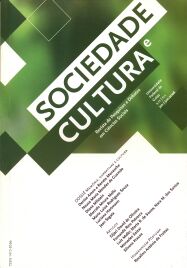Os rumos da utopia brasiliense: observações sobre a representação da capital federal no conto "Brasília" de Clarice Lispector
DOI:
https://doi.org/10.5216/sec.v11i1.4475Keywords:
Brasília, cidade, Clarice Lispector.Abstract
O presente trabalho analisa o conto Brasília da escritora Clarice Lispector, composto em dois momentos: nos tensos anos de 1962 e no auge do “milagre econômico”. Publicado postumamente, o conto é emblemático e permite-nos acompanhar parte das expectativas da sociedade em relação ao futuro da capital. Realizamos uma decomposição do texto e, simultaneamente, um cotejamento com algumas obras historiográficas e sociológicas para compreender o discurso presente no conto. Assim, percebemos no discurso da autora o pressuposto de que a ausência de “povo” acabou por “facilitar” a tomada do poder pelos militares uma vez que sem povo não haveria reação.Downloads
Download data is not yet available.
Downloads
Published
2008-08-03
How to Cite
OLIVEIRA, Dijaci David de. Os rumos da utopia brasiliense: observações sobre a representação da capital federal no conto "Brasília" de Clarice Lispector. Sociedade e Cultura, Goiânia, v. 11, n. 1, 2008. DOI: 10.5216/sec.v11i1.4475. Disponível em: https://revistas.ufg.br/fcs/article/view/4475. Acesso em: 4 mar. 2026.
Issue
Section
Free Articles
License
Authors who publish in this journal agree to the following terms:
- Authors retain the copyright and grant the journal the right of first publication, the work being simultaneously licensed under the Creative Commons Attribution License, which allows the sharing of the work with acknowledgment of authorship and of the initial publication in this journal;
- Authors are authorized to enter into additional contracts separately, for non-exclusive distribution of the version of the work published in this journal (eg, publishing in an institutional repository or as a book chapter), with acknowledgment of authorship and of the initial publication in this journal;
- Authors are allowed and encouraged to post and distribute their work online (eg, in institutional repositories or on their personal page) at any point before or during the editorial process, as this can bring productive change as well as increases the impact and the citation of the published work (see O Efeito do Acesso Livre).



